The Business of Commercial Hop Farming: Interview with Darbro Farms
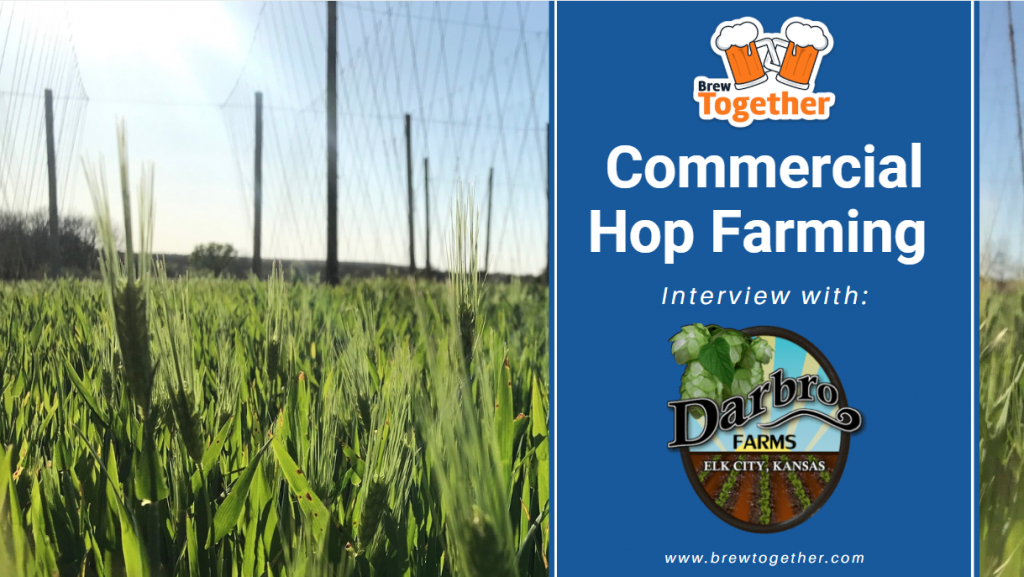

Have you ever been curious about commercial hop farming? It’s not easy, but it might be more achievable than you think! Today we’re excited to share Joel and Holly Darbro’s story of how they started hop farming commercially and how they run Darbro Farms – a hop farm that has been family owned since 1870 on 180 acres located in beautiful Southeast Kansas. We hope you find their story inspiring and their advice helpful!
Let’s start the interview!
Thanks for joining us, Joel! Our hope is that other homebrewers who are interested in commercial hop farming can learn from and be inspired by your experience in running Darbro Farms. We’re excited to be speaking with you!
Tell us a little bit about Darbro Farms!
Darbro Farms is a commercial hop farm in southeast Kansas. This land has had a long and colorful family history dating back to 1870 when my ancestors scraped out a living farming. I purchased the land from my Dad back in the mid 1990s, and we have lived here full time on the farm since 2010.
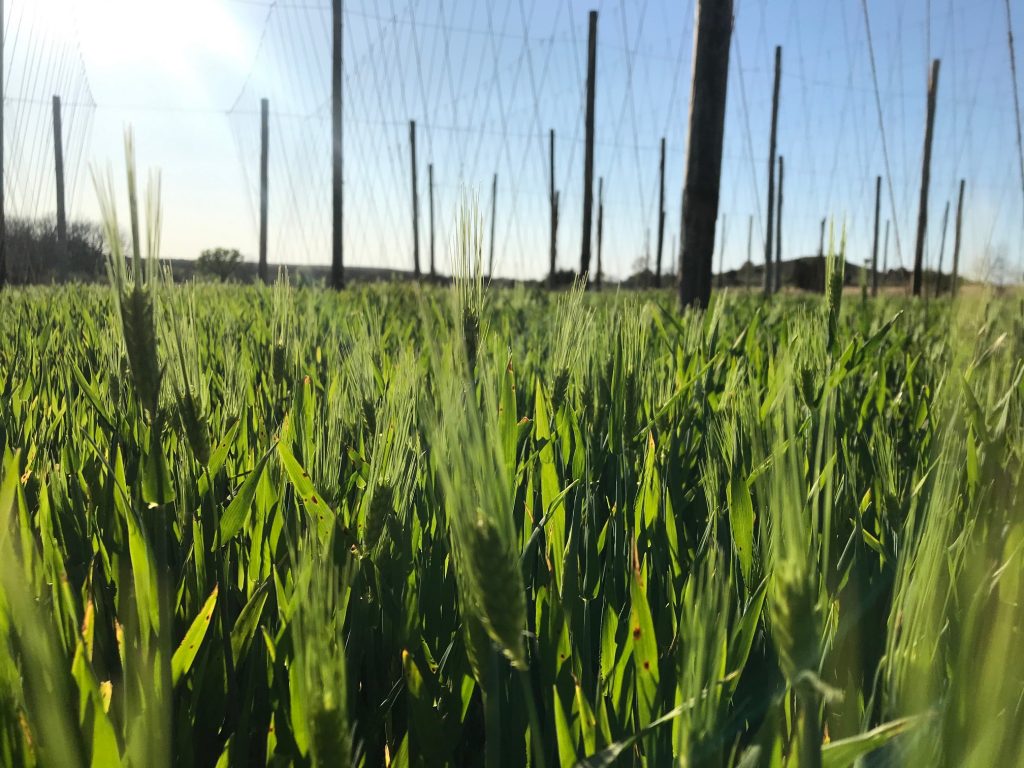

We began growing hops in the garden in 2012, experimenting to see which varieties grew well in Kansas. After we had good success growing and harvesting our garden hops, we started to pursue the idea of hop farming commercially. We did a lot of studying, made plenty of mistakes, but drew up a farm business plan in 2015 and started to develop our hop yard in an overgrown 5 acre field on the SW corner of the farm. We started planting hops on a commercial scale in 2015.
We currently grow Crystal, Chinook, Centennial, Multi-head, Galena and last year planted Columbia and Willamette. This year we made a big push to expand our trellis system and have more plants from those varieties and also the new USDA Triumph variety coming this spring. We have found Crystal to grow very well in our hop yard and have made it our largest variety.
Barring the occasional outside help, this is completely a family operation. All of us were just down in the field trimming back the first shoots of spring. As a more commercial level production comes on, we will no doubt require some outside labor.
Why did you start growing hops commercially?
Growing a conventional commodity crop such as wheat or soybeans on such a small scale wouldn’t be profitable. As Kansas’ craft breweries began to gain momentum, being able grow a fresh local product appealed to us. Hop farming is a good fit on the scale of farm ground we have available.
Our goal is to develop a profitable operation, and effectively utilizing the resources we have available. The 180 acre property is comprised mostly of woods, pasture land, a hay meadow and 14 acres of tillable farm ground.
What makes Darbro Farms hops unique?
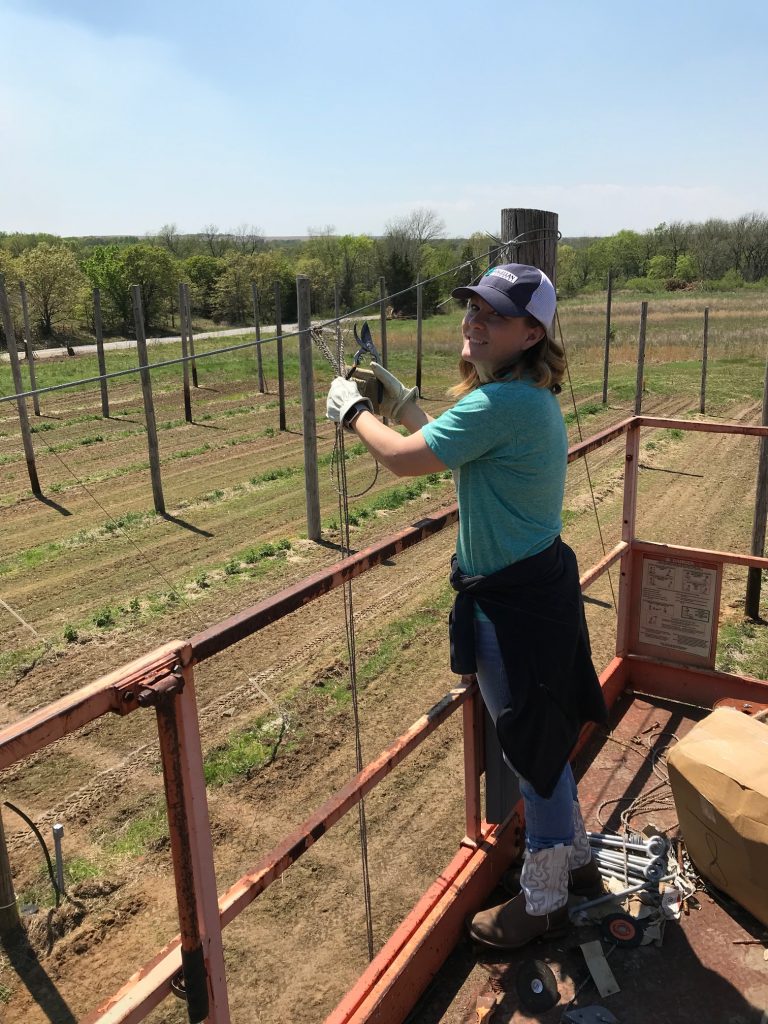

Why buy Darbro Hops when I can get great hops from a hop farm in the Pacific Northwest? Well, I would say each region is going to produce a different tasting hop. Your local soil and environment is going to have a big impact. Not to mention the impact of brewing with a hop that was harvested just days ago. I think it’s the same reason we go to a local tap room or brew pub. You can go to any liquor store now days and find a great beer from one of the big name breweries, but there’s something unique and special about a product grown and brewed local. It’s worth the extra effort and I believe it’s worth supporting.
The total acreage of hops grown in Kansas is probably still less than 10 acres. I believe when craft beer drinkers go to their local tap room, they are looking for something unique. Drinking beer made local and hopefully grown locally is a big part of that.
We are focusing on marketing to commercial brewers and retail resellers. Having been homebrewers for many years though, we would love to see our products find their way into the homebrew market. We have built friendships in the homebrew community such as with Hop of the Month Club and are excited to collaborate with them this summer on some projects.
What advice would you give to someone who was interested in hop farming?
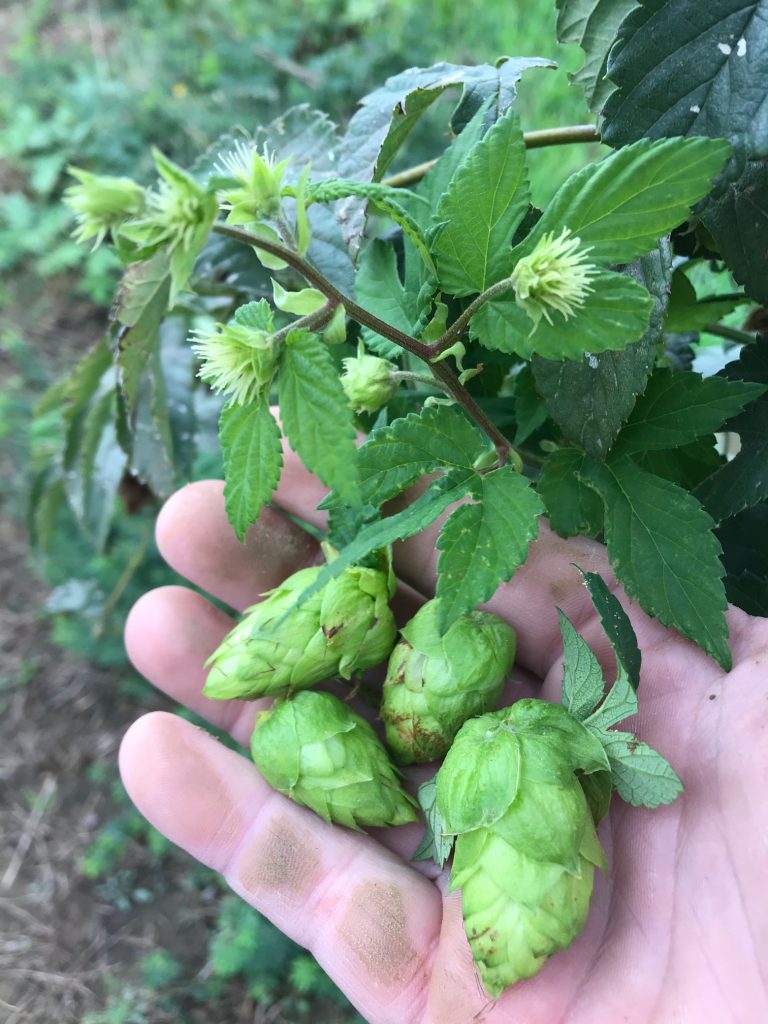

Choosing Varieties
If I could go back and change one thing, the top of that list would be to zero in on just a few strong varieties. Here in Kansas, my row of Centennial has just never taken off. The Crystal on the other hand really seems to like it here. There trouble is, it takes a few years to really figure out which variety is going to do well in your hop yard. It was a tradeoff between spending time experimenting and getting a marketable number of plants in the ground. As painful as it might be, there may come a time I will need to dig up a row and replant to something more successful.
Sourcing Rhizomes
Stick with a very respectable source for hop rhizomes. There are so many pitfalls with ordering plants and rhizomes. You are spending so much effort to get them into the ground and an entire planting season you can’t get back. I had a scare last year thinking I had wound up with a Downey Mildew infection. Luckily it turned out to be a Boron deficiency that can easily be corrected. A small savings isn’t worth bringing a disease into your hop yard or plants that don’t do well. I routinely write to our plant supplier, ask questions and get advice. Make sure you source your rhizomes or plants from a grower that will continue to support you.
Equipment and Growing Techniques
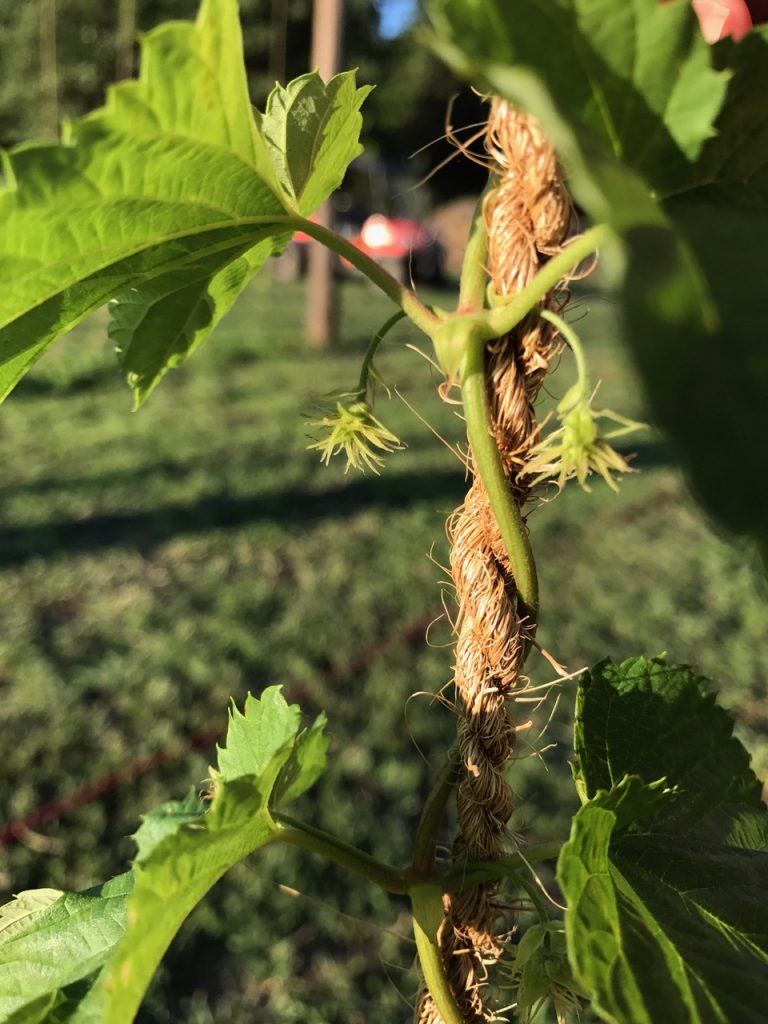

The biggest equipment obstacle to scaling up a hop yard is the harvester and drying equipment. We have built our own modular hop dryer. Above an acre or two, hand harvesting ceases to be a realistic option.
Something I wish I had done earlier was detailed soil testing. Ideally this should be done a year before you put a plant in the ground so you can make major corrections. Like I mentioned above, we had a season of poor growth on a couple rows due to a Boron deficiency.
Marketing and Distribution
Darbro Farms is a member of USAHOPS and we have a registered hop grower number. They are a great resource for best practices and help on food safety and marketing.
.gif)
.gif)
Tell us a little bit about yourself!
When and how did you start homebrewing? What is your current homebrewing setup like?
I started like most people with a plastic fermentation bucket and a glass carboy. The first beer I brewed was some nondescript amber ale that didn’t carbonate all that great. On the positive side, it didn’t get infected and was easily drinkable. Since I like to brew with our own hops and post recipes on our website, I’ve upgraded over the years. I have a couple stainless mash tuns and stainless conical brew buckets. I was an electrical engineer in a past life so I set up an electric system to heat strike water to dial in my mash temperatures. My latest equipment build was a glycol chiller so I can manage fermentation temps year round.
For simplicity, I keg almost all that I brew. I try to keep a keg of beer that showcases our hops on tap all the time to share with friends and visitors.
The latest thing Holly and I have gotten into is Hop Water. When going to the store to find the sparkling water became hard, we decided to make our own and kegged up a batch. That led to a batch of Crystal Hop Water. It’s super easy to make and the smell and taste is subtle and wonderful. Now, I’m not sure why every local brewery doesn’t have one on tap. It’s a great way to really experience the flavors of a specific hop variety.
How did you develop an interest in hop farming?
I love craft beer and farming. I’ve met some really great people involved in the craft beer industry. I was out in Eugene a few months back. The brewer came out to chat with us and invited me in the back to see what he was brewing. I even added some hops to the boil. The American Homebrewers Association was a great resource when I started brewing, and I’ve honestly not run into anyone in the industry I haven’t liked.
What has been your greatest accomplishment and greatest challenge in running Darbro Farms?
When we started putting up hop trellis, there were days I thought this would never get done. We kept plugging away and now have over 2 acres up and growing.


We have definitely faced some major obstacles getting the hop farm up and running. First we had the floods of last year, then the total shut down of business with the pandemic this year. I guess if there’s one thing that’s probably true of most businesses, profitability is probably farther down the road than you might expect. Expect there to be some unplanned events, but hopefully not of these magnitudes for quite a while again.
What is one common myth about hop farming that you would like to debunk?
I always heard from brewers that said the hop yard smelled so amazing. While I enjoy being outside and working in the hop yard, unless you smash a cone in your hand you probably won’t smell a thing. Once you do though, the smell is wonderful. I found last year when a friend came out to visit, even the old dry brown cones left behind still smell hoppy and great when you rub them between your hands.
What is the number one piece of advice that you would give to someone interested in hop farming?
Find another farmer, preferably one with a hop farm, in your area to visit, work with, and to be your mentor. Getting started with a good source of information and advice will make things much easier. There will definitely be days you need help figuring out what to do.
What are your plans for the future of Darbro Farms?
We are focusing on marketing to commercial brewers and retail resellers. Having been homebrewers for many years though, we would love to see our products find their way into the homebrew market. We have built friendships in the homebrew community such as with Hop of the Month Club and are excited to collaborate with them this summer on some projects.
We are also working on infrastructure to add a livestock component to our farm. One that would be complimentary to the hop operation. In one year, I’d like us to be supplying several local breweries with fresh hops. Beyond that, diversify a bit with livestock and hay and continue to learn and improve our product and ability to be consistently profitable.
How can people connect with you?
We are always looking for new ways to collaborate with brewers. I would love to build relationships where brewers can come to the farm and have an input on the hops they will be brewing with.
We love to hear from both home and professional brewers. They can email me at joel@darbrofarms.com, and keep up with us both on Instagram @darbrohops and on our website at www.darbrofarms.com.
Thank you so much for teaching us about hop farming, Joel! Best of luck to you and the rest of the Darbro Farms family in the future!
Thanks for Stopping By!
Are you a brewery or beer industry business owner with a story to share? Send us an email at john@brewtogether.com if you would like to be featured!
Thank you for reading! If you like this article, it would mean the world to us if you would share it with your friends using the social media share buttons below.
If you’re not a member of BrewTogether, we’d love for you to join! BrewTogether is completely free, and signing up is easy! Click here to join!
Affiliate Disclosure: BrewTogether is a participant in the Amazon Services LLC Associates Program, an affiliate advertising program designed to provide a means for us to earn fees by linking to Amazon.com and affiliated sites. BrewTogether is also a participant in an affiliate program with MoreBeer, our favorite online homebrewing equipment/ingredients retailer. Some of the links in this article are affiliate links, which means that if you choose to make a purchase after clicking the link, I will earn a small commission at no additional cost to you. Please feel free to reach out with questions. Thank you for your support!




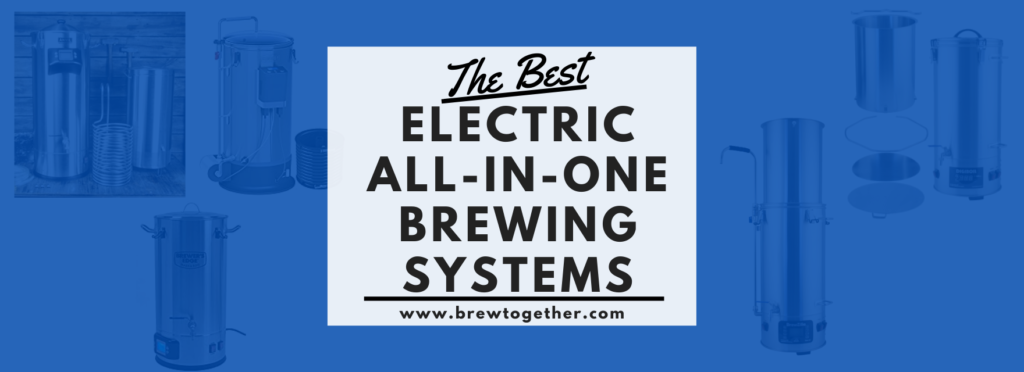

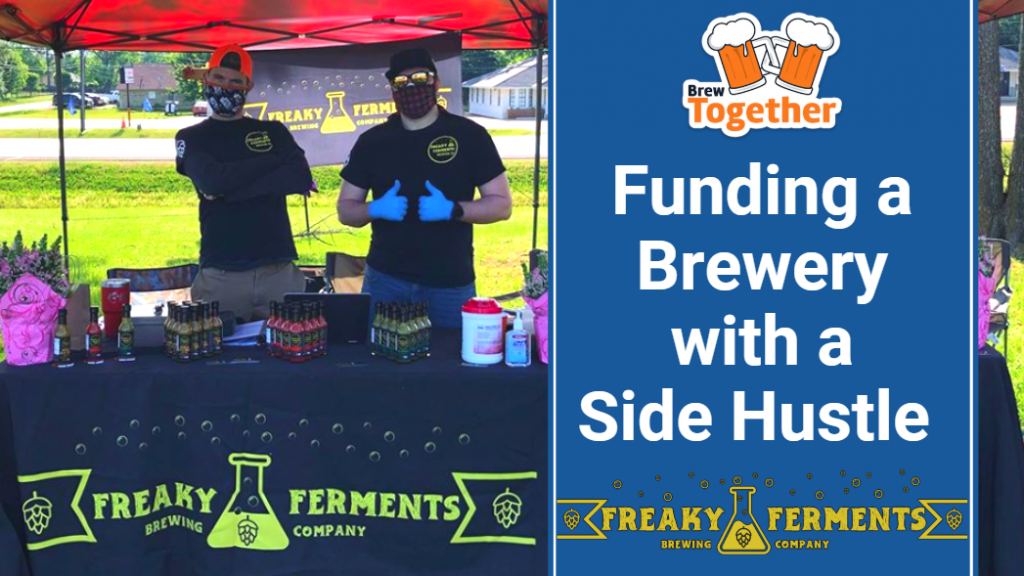

Responses